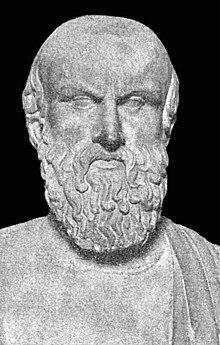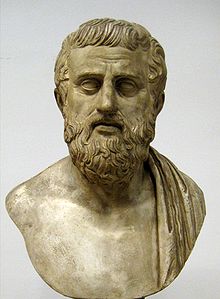Tragedy
An ancient Greek tragedian. He is also the first whose plays still survive.He is often described as the father of tragedy.He was probably the first dramatist to present plays as a trilogy; his Oresteia is the only ancient example of the form to have survived.The work, The Persians is the only surviving classical Greek tragedy concerned with contemporary events, and a useful source of information about its period.Aeschylus entered many of these competitions in his lifetime, and various ancient sources attribute between seventy and ninety plays to him. Only seven tragedies have survived intact: The Persians, Seven against Thebes, The Suppliants, the trilogy known as The Oresteia, consisting of the three tragedies Agamemnon, The Libation Bearers and The Eumenides, together with Prometheus Bound (whose authorship is disputed).
One of three ancient Greek tragedians whose plays have survived. Sophocles wrote 120 plays during the course of his life, but only seven have survived in a complete form: Ajax, Antigone, The Women of Trachis, Oedipus the King, Electra, Philoctetes and Oedipus at Colonus.
The most famous tragedies of Sophocles feature Oedipus and also Antigone: they are generally known as the Theban plays, although each play was actually a part of a different tetralogy, the other members of which are now lost. Sophocles influenced the development of the drama, most importantly by adding a third actor, thereby reducing the importance of the chorus in the presentation of the plot. He also developed his characters to a greater extent than earlier playwrights such as Aeschylus.
A tragedian of classical Athens. He is one of the few whose plays have survived. Some ancient scholars attributed 95 plays to him but according to the Suda it was 92 at most. Euripides is identified with theatrical innovations that have profoundly influenced drama down to modern times, especially in the representation of traditional, mythical heroes as ordinary people in extraordinary circumstances. His works: Medea, Hippolytus, Hecuba, Orestes, etc.
The identity of the threesome is neatly underscored by a patriotic account of their roles during Greece's great victory over Persia at the Battle of Salamis—Aeschylus fought there, Sophocles was just old enough to celebrate the victory in a boys' chorus and Euripides was born on the very day of the battle.
The plays of Aeschylus, Sophocles, and Euripides indicate a difference in outlook between the three men—a generation gap probably due to the Sophistical enlightenment in the middle decades of the 5th century: Aeschylus still looked back to the archaic period, Sophocles was in transition between periods, and Euripides was fully imbued with the new spirit of the classical age.
Dionysus
The god of the grape harvest, winemaking and wine, of ritual madness, fertility, theatre and religious ecstasy in Greek mythology. Alcohol, especially wine, played an important role in Greek culture with Dionysus being an important reason for this life style.Video
- Ancient Greece - A Moment of Excellence (7min, 10min, 33min, 46min)
- We must learn to read
The poem "Youth" by Samuel Ullman
"Youth is not a time of life ; it is a state of mind"




沒有留言:
張貼留言